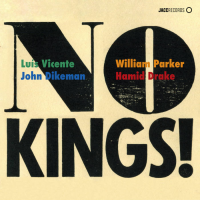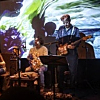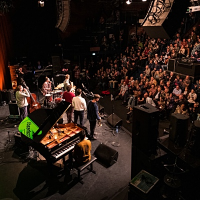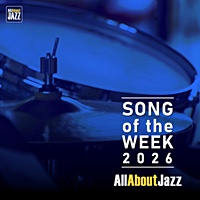Home » Jazz Articles » Hamid Drake
Jazz Articles about Hamid Drake
John Dikeman: No Kings

by John Sharpe
Recorded live in 2022, No Kings documents a volatile meeting between a formidable European horn partnership and American free jazz royalty. In 2015, expat American saxophonist John Dikeman initiated a trio with bassist William Parker and drummer Hamid Drake. Five years later, he invited Portuguese trumpeter Luis Vicente to join them, resulting in the quartet heard here on its second album, following Goes Without Saying, But It's Got To Be Said (JACC Records, 2020). The reedman and brass player share ...
Continue ReadingWilliam Parker / Hamid Drake / Cooper-Moore: Heart Trio

by John Sharpe
By largely leaving behind their main instruments, three stalwarts of the New York avant jazz scene tap into something timeless and elemental on Heart Trio. Instead of his customary bass, William Parker wields an array of flutes, double reeds, and the doson ngoni, a six-stringed hunter's harp from West Africa allegedly the ancestor of the banjo. His long-time partner Chicago drummer Hamid Drake remains at his kit, which he supplements with a frame drum, while erstwhile pianist Cooper-Moore, another habitué ...
Continue ReadingAlbert Beger / Ziv Taubenfeld / Shay Hazan / Hamid Drake: Cosmic Waves

by Glenn Astarita
Cosmic Wave is a stellar collaboration between tenor saxophonist Albert Beger, bass clarinetist Ziv Taubenfeld, bassist Shay Hazan and drummer Hamid Drake. The quartet, drawing from their diverse backgrounds and rich musical experiences, delivers an album that merges free jazz, avant-garde and spiritual music into a charismatic sonic journey. With roots spanning Israel and the United States, these musicians bring an eclectic mix of influences to the table, resulting in a sound as vast and varied as the cosmos itself. ...
Continue ReadingPaul Dunmall: Bright Light A Joyous Celebration

by John Sharpe
While the opener suggests a blowing session from veteran British saxophonist Paul Dunmall, as good as that promises to be, the reality is better still. Joining him is a starry cast drawn from succeeding generations, with the addition of American drummer Hamid Drake. With the drummer touring in the UK. Dunmall took the opportunity to renew a friendship that stretches back almost two decades, one first heard on the fiery Peace And Joy (Slam, 2006). Alongside them in the studio ...
Continue ReadingHu Vibrational: Timeless

by Geno Thackara
An Adam Rudolph recording is less a collection of musical pieces than of sound paintings. The elements he works with are musical ones--any instrument known to mankind might be used, and often even used to play notes--but traditions of form and melody tend to be tossed out the window from the start. The tones are treated as daubs of paint on a palette, splashed here and there whenever they will add something to whichever imaginary landscape he is evoking at ...
Continue ReadingSteve Swell's Fire Into The Music: For Jemeel: Fire From The Road

by Alberto Bazzurro
Oltre tre ore di musica catturate in altrettante esibizioni live fra Texas (due, ottobre 2004) e Canada (la restante, settembre 2005) e oggi rese opportunamente disponibili sono ciò che ci offre questo triplo album composito ma per altri versi assolutamente monolitico. Lo firma un superquartetto, sempre quello, che attraversa i sette ampi brani (il primo occupa l'intero primo cd) con fare deciso, ottima capacità di gestire l'evolversi della musica prodotta, i suoi spazi intestini, felicemente bilanciati fra parti corali e ...
Continue ReadingHamid Drake, Shabaka Hutchings, Simo Lagnawi al Teatro Golden di Palermo

by Maurizio Zerbo
Shabaka Hutchings, Hamid Drake, Simo Lagnawi Nomos Jazz Festival Teatro Golden Palermo 22.11.2023 Ci sono concerti che sintetizzano le finalità e la storia delle più lungimiranti associazioni musicali. Il magnifico set del trio costituito da Hamid Drake, Shabaka Hutchings, e Simo Lagnawi può essere elevato a simbolo di una policentrica direzione artistica che ha sempre fatto prevalere la qualità delle idee. In primo piano la forza ancestrale della musica gnawa del Marocco, nei suoi ...
Continue Reading


















